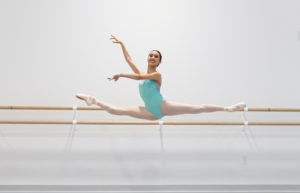English National Ballet’s Newest Members of the Corps: Ashley Coupal and Shunhei Fuchiyama
- Home
- Features 2020 - 2023
- English National Ballet’s Newest Members of the Corps: Ashley Coupal and Shunhei Fuchiyama

By Maggie Foyer
It was a cold, grey, wet, and windy day when I met up with Ashley Coupal and Shunhei Fuchiyama at English National Ballet headquarters, but the enthusiasm they showed for their new London life brought out the sunshine. Both young dancers are already stars in the scintillating firmament of ballet competitions and, as prize winners in the 2021 Prix de Lausanne, were offered contracts with ENB, joining the corps de ballet in summer 2021.
When I asked if the company would have been their first choice, Coupal, who is from Vancouver, Canada, said, “Absolutely, 100%. Working in London was always one of my dreams.” Fuchiyama, born in Saitama, Japan, agreed: “I saw ENB dancing Le Corsaire in Tokyo when I was 15 years old, and it was amazing. My dream role is Ali, it has so many high jumps and turns!” “Shunhei is a super crazy jumper,” added Coupal, highlighting the nurturing atmosphere at ENB, where a fellow dancer is always keen to offer support.

Although Coupal and Fuchiyama had met online (the 2021 Prix was a virtual competition), they first met in person at ENB’s state-of-the-art home on City Island. The company relocated there in 2019, moving from their historic neighbourhood next to the Albert Hall to London’s trendiest development in the docklands area nestling on the Thames.
“I was so nervous — the facilities, the big studios, I couldn’t believe it,” said Fuchiyama, recalling their first day. “The amount of cross-training facilities took my breath away,” said Coupal. “They have a pool, two gyms, a Pilates room, and an area for the medical team to check us out; I was really impressed by that.” But, of course, it’s the people that count and, she said, “The whole company was so welcoming and friendly when we first came.” Fuchiyama found the friendship extends to practical help. “First soloist Ken Saruhashi coaches me and helps me with partnering; also [fellow member of the corps de ballet] Rentaro Nakaaki, he helped me a lot, too.”

Coupal has an interesting take on the transition from competition dancing to joining the corps de ballet. “I personally felt my competition experience really helped when I entered ENB. Companies want a dedicated dancer, prepared for any situation, because onstage you never know what will happen. When you compete, you have to do your best, you’re tenacious and work hard, which gives you confidence. It also helped me work with other people. In solo training, you work with your teacher and absorb many corrections. In a corps, you’re hearing that advice from other colleagues as well as [from those in charge at] the front of the room, so you get this extra sense: listening to partners around you and gaining situational awareness.”
English National Ballet’s most engaging annual event is the Emerging Dancer competition, which brings mentorship to the fore as the six competitors are chosen and mentored by fellow company dancers. The event was presented in-house at the beginning of the 2021-2022 season when the two newcomers had just arrived. “It’s a wonderful opportunity for new dancers, and it was inspiring to see our colleagues onstage. This was our first time in a company and we were able to get an idea of the dancers and the talent,” said Coupal. Fuchiyama added: “We watched it live in the studio theatre, cheering and clapping at the back.”

The two were also enthusiastic about the current repertoire: Akram Khan’s Creature, The Nutcracker and, in January, the premiere of Raymonda, choreographed by director Tamara Rojo. They welcomed opportunities to work onstage in Creature, and had a busy Christmas in a diverse range of roles as Flowers, Snowflakes, Guests, and Soldiers in The Nutcracker. They also had the opportunity to understudy more important roles.
Both were excited to be involved in creating the new Raymonda with Rojo. “The ballet is not performed often, so it’s a very special opportunity,” said Coupal. As for Khan’s Creature, “It was not like any classical [ballet] work, I couldn’t move my shoulders the next day,” said Fuchiyama. Coupal, who recalled “being sore in a million places,” said, “The details in Creature were super precise, holding your hand up in a particular way and rotating it back and forth. It was very specific. We definitely had to do extra homework for that one!” Fuchiyama mentioned how much the other dancers helped them. “And not just with the steps, also with the counts. The music [by Vincenzo Lamagna, who uses a landscape of sounds as well as orchestral playing] is very hard to count.”
“It’s all about your mindset when you enter the room,” explained Coupal. “I just treat it like fun and [accept that] it’s my job.” “Yes,” said Fuchiyama, “this is the job we chose.” Then, in chorus: “And we love it!”
Outside the studio and theatre, the dancers have been soaking up London’s rich culture. Fuchiyama has discovered the many Japanese restaurants. Coupal is loving the history, and the art and architecture. Both have visited the National Gallery and the British Museum and found time to see other companies in performance, enthusing about the Royal Ballet’s Giselle at the Royal Opera House with Marianela Nuñez and Vadim Muntagirov.
Before leaving, I asked for their advice to other young dancers. Once again, they were in agreement: “Don’t give up! Even during the pandemic — don’t give up!”

